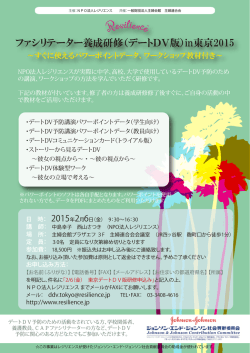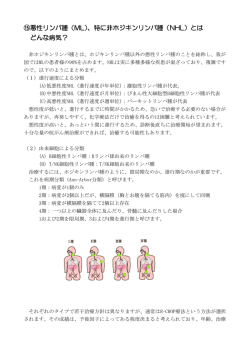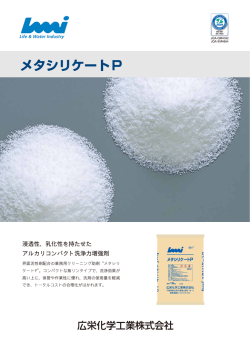
Resilience assessment based on risk concept
2014/7/23 ISAP 2014, Yokohama リスク論に基づく レジリエンスアセスメント手法 Resilience assessment based on risk concept 大阪大学大学院工学研究科 環境・エネルギー工学専攻 東海明宏、中澤 暦、中久保豊彦、山口治子 Akihiro Tokai, Koyomi Nakazawa, Toyohiko Nakakubo & Haruko Yamaguchi Div. Sustainable Energy & Environmental Engineering Graduate School of Engineering, Osaka U., JAPAN 発表内容 Contents 1.リスク論に基づくレジリエンス評価 Resilience assessment based on risk concept 2.レジリエンス評価手法と実際適用 Practical application of resilience assessment 3.評価事例解析の共有とさらなる展開 Sharing the case study and further tasks 1 1.リスク論に基づくレジリエンス評価 Role of resilience assessment based on risk concept リスク論によって得られたこと What obtained in risk science area Multiple risk assessment focusing source: 技術のリスク評価 技術のリスク・・・ Chauncey Starr, Paul Slovic, others Profiling technological risks in terms of risk variables 対策の評価(リスクと暴露人口)multiple risk evaluation. USEPA, others Managing principle based on lifetime risk and population size 対策の費用対効果(Cost/Life year saved) John Graham, others Managing principle based CPLYs for alternative comparison Multiple risk governance 都市(自治体)のリスク評価 対策によって防ぎきれないことを前提に住民の生命・資産を守る ため対策が必要。Multi‐phased alternatives for managing multiple risks under the concept of fail safe, or resilience 2 1 2014/7/23 1.リスク論に基づくレジリエンス評価 (続) Role of resilience assessment based on risk concept…continues ねらい Focus • 都市が曝されるリスク全体を取りあげる Employing actual multiple risk in urban area • 全体を把握し、ついで個別のリスク事象制御へという 段階別アプローチ Hierarchical approach composed of screening multiple risk and analyzing specific response profile 3 1. リスク論に基づくレジリエンス評価‐枠組み 定常 Usual 環境負荷( 機能の低下) Environmental burden or lack of performance 途絶抵抗研究 Resistance against lifeline outage fullness of measures Unusual condition 非定常 外力 Beneficial change by a measure External force 対策導入でレジリエンス改善 Natech researches (OECD) 政府・ 自治体の対応 Framework of resilience assessment based on risk concept これまでのリスク研究 転換策 Shifting 予防策 順応策 SafeguardAdaptation 緩和策 Abatement リスク Level of risk 4 2 2014/7/23 2.レジリエンス評価手法と実際適用 Practical application of resilience assessment Diagnosis Risk comparison: usual and unusual case Qualitative/Comprehensive Findings on 自治体の self diagnosis 自己診断 results in each 情報 local government ・Understanding which datasets are needed to build up the resilient city ・local environmental design 自治体 Local government Evaluation of resilient options Resilience evaluation :effects of the provision and response of the risk Self diagnosis Evaluation of Resilience: Comprehensive, qualitative Development unusual risk scenarios: Classification in patterns Pick up the important ‘Flow and stock’ in each local government Identification multiple risk Development of resilience capacity Method application to local government in Japan and other countries 5 2‐1定性網羅性評価 Qualitative multiple evaluation 1.関係者・専門家を集め、 Brain storming, Workshop開催。都市の リスクの抽出. 2.抽出された複数の要素 の波及構造を解析 (DEMATEL法) 3.複数の要素の様相を 解析(主成分分析) 4.都市のレジリエンスを 脅かすリスクの抽出。 5.自治体のレジリエンス に関わる対策の調査 代表的文献整理 literature survey, expert work shop 都市にかかる外力やhazardを抽出する, Extracting urban multiple risks 外力やhazard同士の関係の一対比較アンケート調査: Paired comparison of each risks by DEMATEL法 波及構造, diffusion process 外力やhazardを主成分分析によって類型化 Principle component analysis of multiple risks Based on the work done Slovic (Perception of risk). Profile of multiple risk Prioritization of target OK? risks 自治体の事務事業評価書、計 画書の調査 Analysis of local government activity report Questionnaire survey to local government staffs and experts. 階層分析法 AHP 6 3 2014/7/23 2‐1 マルチプルハザードの抽出 Extraction of multiple hazard 技術 Technology 自然 Natural phenomena 社会 Institutions 1.気候変動, climate change 2.エネルギー自立, self-support energy 3.生態系の破壊, damage to eco-system 4.自然災害, natural disaster 5.都市インフラ整備の度合い, urban infra. 6.日常生活における不自由さ, disability daily life 7.ライフスタイルの変化, the way of living 8.環境汚染物質排出量, emission amount of pollutants 9.環境質の変化, environmental quality change 10.自然資源の利用度合い, natural resources 11.自然からの恩恵の享受量の変化, natural resource benefit 12.社会のひずみ, problem of social justice 13.人口集中社会, over densely habitation 14.社会の安全保障の低下・阻害, social security 15.企業経営の失敗・減退, failure of company management 16.経済危機, economic crisis 17.社会を混乱させる行為, social disorder behavior 18.1つのエネルギー源への依存, dependence single energy resources 19.エネルギー供給の不安定性, unstable energy supply 20.インフラ(整備)への過剰投資, excess investment to infrastructure 21.ライフラインの途絶, lifeline stoppage 7 2‐1 リスク懸念の分析結果 Estimated results of risk concern on each external forces Uncontrollability Natural disaster Dread (Concern of risks) Damage to eco‐system Self‐support energy Climate change 8 4 2014/7/23 2‐1 レジリエンスの自己診断結果 Evaluated results of sufficiency level of resilience Resilience (Relative importance × options) 0.09 Resilience Level 1 (Risks in the city) a Climate change Level 2 (Provision for the risks) ①Abatement b Energy c Ecological independence damage ②Safeguard ③Adaptation d Natural disaster ④Shifting 0.08 0.07 Higher risk & higher resilience 0.06 Inter local government variation (n=10) Intra local government variation (n=3) 0.05 0.04 0.03 Concern of risks (Dread) 0.02 -2 -1 0.01 0 Lower risk & lower resilience 1 2 3 4 5 6 0 9 2‐2 外力応答評価の枠組み設計と適用 Water system and industrial activity in Yodo・1river basin. 下水処理場 Sewage treatment plants S1 吉祥院下水処理場 S2 鳥羽下水処理場 S3 伏見下水処理場 S4 石田下水処理場 S5 洛西下水処理場 S6 洛南下水処理場 S1 S2 ・2 ・1 S4 S3 S5 ・1 S6 ・1 Case‐1: four facilities plotted by 1. P1 Case‐2: one plant plotted by 2. P2 P3 Case‐3: Sewage treatment plants (S1 – S6) P4 P6 P7 P5 Disaster triggered chemicals emission sources 浄水場 Purification plants P1 P2 P3 P4 P5 P6 P7 大阪市 大阪府 枚方市 大阪府 大阪市 大阪府 大阪市 豊野浄水場 村野浄水場 中宮浄水場 庭窪浄水場 庭窪浄水場 三島浄水場 柴島浄水場 楠葉取水場 磯島取水場 磯島取水場 (同地点取水) (同地点取水) 一津屋取水場 一津屋取水場 10 5 2014/7/23 2‐2 外力応答評価の枠組みと実際適用 Framework of quantitative resilience evaluation and its application • 外力応答評価(大阪府・市,淀川取水7浄水場) Estimated result of water resilience of Osaka province & city 重要なフロー・ストック Important stock & flow: 平常時のリスクの推算結果有。 Accumulated researches conducting risk assessment on usual situations • amount of water [103 m3/day] • 「産業」+「生活」=>化学品+水資源 “industry” + ”Life” → Chemicals + Water 現有のレジリエンス対策 Assumed large‐scale Earthquake occurred in Kyoto city Case‐2 ホルムアルデヒド Formaldehyde 取扱量が10万t以上の届出事業所1施設より流出. Sudden release from 1 Registered plants where more than 100,000 ton of formaldehyde is stocked. Case‐3 ほう素化合物 Boron compound すそ切り以下事業所での貯蔵量の20%が下水道 移動量で流出. 20% of regional amounts of boron compound stocked in non registered plants will be released into sewage pipeline. 2‐2 対策効果分析 防液提・予備タンク設置 の強化 Resourceful Thorough install of ness multiply-layered blocks and backup tanks Measures to a short term effect Recovery Adaptability 応急措置 Emergent measures Supply by backup water transfered by other plants with another water sources 500 10 * * 1 0.1 * exceeded [Case‐1] Toluene (standard: 0.20 mg/L) concentration * 0.01 [Case‐2] Formaldehyde (standard: 0.08 mg/L) 0.001 0.0001 [Case‐3] Boron compound (standard: 1.00 mg/L) 0.00001 0.000001 11 水道事業 Water supply works 下水道業 Sewage treatment works 下水処理管渠の耐震化 Earthquake-resisting wastewater pipeline B ダム等からの緊急放流 Water volume discharged by dams 住民生活,都市活動 Demand sectors A 節水活動 Water saving B 活性炭処理・オゾン処理の導 入 Introduction of activated A 既設プロセスの活用(吸 carbon and ozone disposal 着マットの使用,最初沈殿 民間ビル内や家庭 systems 池等での薬品処理や沈殿 での備蓄水の活用 備品・薬品の活用 Utilization B 処理,等) B Use of water stock B of equipments and chemicals B Utilization of disposal in buildings and in an acute situation systems set for an acute houses 技術の追加(逆浸透,等) situation Supplemental introduction of C removal technologies B - 工場・事業所の移転 Transformab translation of large ility scale plants - 原因究明・影響低減確認 Speed of investigation and confirmation - 摂取制限等を伴う水道水の給 水継続 Water supply with C restriction of water intake C - B - - - - 下水処理場間の下水融通 浄水場間の配水幹線のネット 用幹線の整備・処理能力 ワーク化・浄水能力の分散化 の分散化 Networking C Networking and and Decentralization of decentralization of sewage treatment plants purification plants 地下水・雨水・再生 水の活用 Use of D groundwater, rain C water and recycled water in buildings Adaptation Recovery - 処理機能の段階的回復 Gradual recovery B B - Regime shift - 放流位置の再編 Restructuring effluent points 取水源の再編 C Restructuring water intake sources C - Transformab ility 復旧速度の向上 Recovery speed B A ‐ D is set by present fullness of measures in Osaka's water metabolism systems. A: Already introduced - 長期的影響 Prevention への対策 Redundancy 浄水場の耐震化 B Earthquake-resisting purification plants - 下水処理場の耐震化 Earthquake-resisting sewage treatment plants Resistance & Reliability Measures to a long term effect Supply by water stock in 7 purification plants 1,000 浄水濃度評価(枚方・磯島取水) Hirakata site Estimated result of a chemical concentration in tap water Adaptation Regime shift 1,500 How resilience is resilience enough? 流出防止蓋・緊急遮断弁 Resistance 設置の強化 Thorough B & Reliability install of shut down caps and valves 短期的影響 への対策 Water supply by 7 purification plants 2,000 Measures effectiveness analysis 工場・事業所 Plants and facilities Prevention 2,500 Normal tap water demand 流出シナリオ Chemicals release scenario Case‐1 トルエン Toluene 214の届出事業所のうち4事業所で流出が生じ,雨 天条件下で公共用水域へ流出. Sudden release from 4 Registered plants among 214 plants using toluene in a rainy weather situation. Chemical concentration in tap water [mg/L] 花折断層帯 想定地震 京都市、 京都府南部 震度6強~7 (京都府2008 年度公表値) 3,000 0 Present resilience measures 外力 Pressure Recovery of water intake from Yodo river Outage - B: Updated based on revised guidelines, regulations and manuals C: Subject of future investigatio n D: not effective 12 6 2014/7/23 3.評価事例解析の共有とさらなる展開 Sharing the case study and further tasks ■得られたこと:リスク論に基づくレジリエンス評価のプロ トタイプモデル。リスクレベルと自治体で実施している対 策(種類)からレジリエンスからみた自己診断が可能。 Outreach: Self diagnosis of multiple risk governance ■課題・留意点:地域ごとのリスクの優先順位を把握後、 data availabilityを考慮し手法のカスタマイズが必要。 Customizing methodology consideration of data availability. Reduced version of model building 事例検討の継続と事例ベース構築を通じた共有化 Case base of resilience evaluation 13 7
© Copyright 2026


